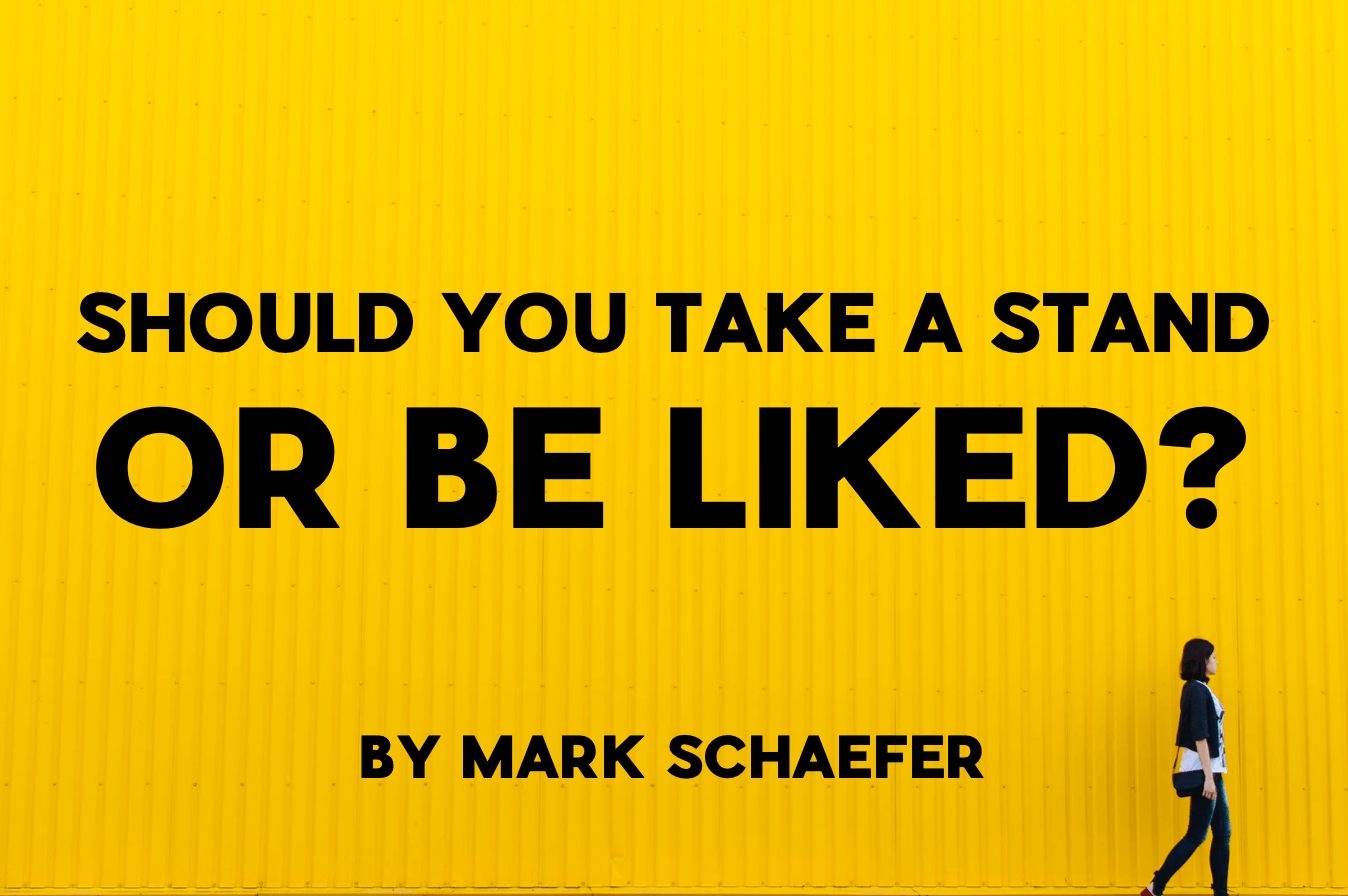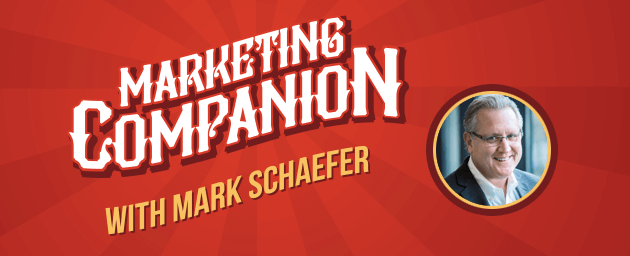I had an interesting exchange on LinkedIn worthy of sharing with you today. Should you take a stand on the web even if it’s controversial, or should you aim to be liked?
When I published a post encouraging people to keep blogging, a LinkedIn connection left a fiery commentary encouraging us to take on the naysayers, stand up for our truths, and let the rest of the world be damned.
She said that it doesn’t matter if we are liked in the process. Our personal truth and taking a stand are the only things that matter in the end.
This might seem weird, but today I’m going to disagree with that impassioned statement … at least partially.
Taking a stand is important. But being liked does matter … and I’ve seen the other side of that.
Creating content, taking a stand
Whether I create a post, podcast episode, or book, my aim is to:
- Tell the truth to the best of my ability
- Be nice about it
- Never let my readers down.
That last one is vitally important. Every time you spend time with me I want it to be worth your time!
As I have navigated through more than a decade of blogging, I have publicly disagreed with almost every thought leader in our space. Off the top of my head, I can remember writing posts that disagreed with
- Seth Godin
- Gary Vee
- Jay Baer
- Marcus Sheridan
- Joe Pulizzi
- Chris Brogan
- Gini Dietrich
- Christopher Penn
- Mitch Joel
There are many more. I have probably disagreed with almost anybody you can think of at some point in the life of this blog.
I am not a disagreeable person, and I’m not creating these positions simply to be contentious. It is a very heavy decision to take a stand when it means taking an opposite opinion from a friend.
But it’s so important.
Disagreement equals growth
I disagree with people because it’s necessary. We will never grow in our profession if everybody out there just agrees with everybody. If we all just say “yes” all the time, the web will be nothing more than a worthless echo chamber of guru-speak.
I grew up in a corporate culture that encouraged disagreement. I once had a boss who told me, “If you don’t state your true opinion, you’re cheating the company. We’re employing your whole brain.”
Let’s extend that to the social media world. If you want to stand out, if you want to be seen as an authority, can you achieve that by contributing just half your brain?
I want to set an example and show that you can have a debate in a professional way and the world will not fall apart. As far as I know, I have a friendly and positive relationship with everybody on this “disagreement list.” Any of these folks would come over to my house for dinner, and some of them have.
I also encourage people to disagree with me in return. At least I hope people feel comfortable doing so.
But telling my truth and taking a stand is not always easy. Sometimes, it hurts.
It is important to be likable
In business, it is important to be liked.
I know that flies in the face of this whole “take no prisoners” philosophy of telling your personal truth through your blogs or videos.
But it is an undeniable psychological and sociological fact. Likable people get ahead more than contrarians. I know many average performers who had stellar careers almost entirely because they were so darn likable.
Likable people get hired. Likable people get promoted. Likable people have more friends to help them along the way. Likability matters.
Contrarians fade away
Over my long career on the social web, I’ve seen many people come and go. The nice people are still standing. Every person who created a destructive or toxic online persona is either gone or irrelevant.
Every single one.
Bullies can attract a lot of attention. It’s sort of like watching a fight on the school playground. The bully may command attention for a short period of time, but nobody really wants them to succeed long-term or trusts them to be a friend.
Hateful people just don’t last in this space.
So, it’s important to disagree. Just don’t be an ass about it.
Personal impact
Overall, I think I have done an OK job speaking my mind and remaining a likable person. But without question, taking a stand creates awkwardness, and many times I’ve felt like an outsider in my own industry.
Perhaps the most dramatic example of this was the Content Shock article I wrote five years ago, a post that is still widely referenced and discussed today.
This was a post that upset a lot of people. Why? Back then, half the world had “content evangelist” in their job description. When I said there are economic limitations to the value of content when there is too darn much of it, it posed a personal threat.
I was attacked for more than three weeks after that post came out. I was ridiculed and even laughed at on one memorable podcast episode. All of this came as a surprise. To me, what I wrote was just common sense. I was just telling the truth.
With that blog post, and a few others over the years, I had not earned a place at the top of the content marketing “friends and family list.” I was shunned.
On one level … that hurt. It ALWAYS hurts when you’re not in the inner circle with your friends, no matter who you are.
But I have no regrets about any stand I’ve taken because I’ve never attacked people — I attacked issues — and opened a debate that needed to be opened. In some ways the Content Shock post, and the manner in which I responded, helped define my career.
The game plan
So, let’s get back to my LinkedIn friend who wants to take on the world at any cost.
I want you to speak your truth and say what needs to be said. But follow a few guidelines.
- Never disagree on an emotional level. Write what you need to write but don’t publish it in the heat of the moment. Come back to it three days later — after you’ve calmed down!
- Do your homework. Get your facts straight. Do your best to speak the truth with accuracy and compassion.
- Attack issues, not people.
- Expect pushback. If people disagree with you, that is a gift. It shows you are prompting discussion and making people think. Good job.
- Take the heat with grace. Stay positive.
- Don’t just dwell on one negative comment when there are nine positive comments.
- If somebody disagrees with you in an uncharacteristically harsh way, pick up the phone and talk it out like a friend.
- Be patient. For a time, you might feel distanced from the “in crowd.” Sometimes, there is a trade-off between winning friends and earning respect. Respect will pay long-term dividends and your true friends will always be your true friends.
My message is, be brave. Be bold. Tell the truth. Take risks. But take care of people along the way, too.
Make sense?
 Mark Schaefer is the chief blogger for this site, executive director of Schaefer Marketing Solutions, and the author of several best-selling digital marketing books. He is an acclaimed keynote speaker, college educator, and business consultant. The Marketing Companion podcast is among the top business podcasts in the world. Contact Mark to have him speak to your company event or conference soon.
Mark Schaefer is the chief blogger for this site, executive director of Schaefer Marketing Solutions, and the author of several best-selling digital marketing books. He is an acclaimed keynote speaker, college educator, and business consultant. The Marketing Companion podcast is among the top business podcasts in the world. Contact Mark to have him speak to your company event or conference soon.
Illustration courtesy Unsplash.com



